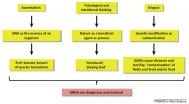The appeal of being anti-GMO
2015-04-24
(Press-News.org) A team of Belgian philosophers and plant biotechnologists have turned to cognitive science to explain why opposition to genetically modified organisms (GMOs) has become so widespread, despite positive contributions GM crops have made to sustainable agriculture. In a paper published April 10 in Trends in Plant Science, they argue that the human mind is highly susceptible to the negative and often emotional representations put out by certain environmental groups and other opponents of GMOs. The researchers urge the general public to form opinions on GMOs on a case-by-case basis, thereby not focusing on the technology but on the resulting product.
"The popularity and typical features of the opposition to GMOs can be explained in terms of underlying cognitive processes. Anti-GMO messages strongly appeal to particular intuitions and emotions," says lead author Stefaan Blancke, a philosopher with the Ghent University Department of Philosophy and Moral Sciences. "Negative representations of GMOs--for instance, like claims that GMOs cause diseases and contaminate the environment--tap into our feelings of disgust and this sticks to the mind. These emotions are very difficult to counter, in particular because the science of GMOs is complex to communicate."
Examples of anti-GMO sentiment are present around the world--from the suspension of an approved genetically modified eggplant in India to the strict regulations on GM crops in Europe. Contributing to this public opposition, the researchers suspect, is a lack of scientific understanding of genetics (not even half of the respondents in a US survey rejected the claim that a fish gene introduced into a tomato would give it a fishy taste) as well as moral objections to scientists "playing God."
"Anti-GMO arguments tap into our intuitions that all organisms have an unobservable immutable core, an essence, and that things in the natural world exist or happen for a purpose," Blancke explains "This reasoning of course conflicts with evolutionary theory--the idea that in evolution one species can change into another. It also makes us very susceptible to the idea that nature is a force that has a purpose or even intentions that we shouldn't' meddle with."
While religious beliefs, particularly those that hold a romantic view of nature, have been accused of generating some of the negativity around GMOs, Blancke and his co-authors argue that there's more to the story. Using ideas from the cognitive sciences, evolutionary psychology, and cultural attraction theory, they propose that it is more a matter of messages competing for attention--in which environmental groups are simply much better at influencing people's gut feelings about GMOs than the scientific community.
"For a very long time people have only been hearing one side," Blancke says. "Scientists aren't generally involved with the public understanding of GMOs, not to mention the science of GMOs is highly counterintuitive and therefore difficult to convey to a lay audience--so they have been at a disadvantage form the start."
The researchers believe that understanding why people are against GMOs is the first step toward identifying ways to counteract negative messages. Blancke and co-author Geert De Jaeger, a plant biotechnologist, started in their community by developing a public lecture to dispel myths about GMOs. They urge others to build science education programs that can help balance out anti-GMO campaigns.
"We want to bring the two sides more together," Blancke says. "You cannot say every GMO is bad. You have to look at each case separately to make a judgement."
INFORMATION:
Trends in Plant Science, Blancke et al.: "Fatal attraction: the intuitive appeal of GMO opposition" http://dx.doi.org/10.1016/j.tplants.2015.03.011
Trends in Plant Science (TiPS), published by Cell Press, is a monthly review journal that features broad coverage of basic plant science, from molecular biology through to ecology. Aimed at researchers, students, and teachers, its articles are authoritative and written by both leaders in the field and rising stars. For more information, please visit http://www.cell.com/trends/plant-science. To receive media alerts for TiPS or other Cell Press journals, please contact press@cell.com.
[Attachments] See images for this press release:

ELSE PRESS RELEASES FROM THIS DATE:
2015-04-24
DURHAM, N.C. -- Orphaned children in low- and middle-income countries face a high risk of trauma, with physical and sexual abuse being by far the most prevalent traumatic events.
New research shows that orphaned boys in these settings are just as likely to experience abuse as girls. As a result, the study authors suggest targeting more support services and prevention programs toward protecting vulnerable boys.
Researchers from Duke University and the University of North Carolina at Chapel Hill found that physical and sexual abuse affects 12 percent of girls and 14 ...
2015-04-24
Thinking "time is money" can be a barrier for people to act in environmentally friendly ways, even for tasks like recycling that take mere seconds, according to UBC research.
As Earth Day approaches on April 22, this dynamic has led to an unsettling outcome.
"Putting a price tag on time leaves individuals to focus on their own needs and goals, as opposed to the needs and goals of others, including the environment," says Ashley Whillans, PhD student in UBC's Department of Psychology and lead author of a paper on the subject.
In one of the paper's studies, a group of ...
2015-04-24
The gold standard for analyzing the behavior of fusion plasmas may have just gotten better. Mario Podestà, a staff physicist at the U.S. Department of Energy's Princeton Plasma Physics Laboratory (PPPL), has updated the worldwide computer program known as TRANSP to better simulate the interaction between energetic particles and instabilities - disturbances in plasma that can halt fusion reactions. The program's updates, reported this week in the journal Nuclear Fusion, could lead to improved capability for predicting the effects of some types of instabilities in future ...
2015-04-24
Negative feedback can sting, but thinking about the big picture may help transform criticism into positive change, according to new research published by the Society for Personality and Social Psychology.
"People are defensive when they are told about something they did wrong," said lead researcher Jennifer Belding, Ph.D., from Ohio State University. "Listening to negative feedback requires self-control because you have to get past the fact that hearing it hurts and instead use the information to improve over time."
In three experiments, researchers found that ...
2015-04-24
24.4.2015: Gigantic volumes of hot material rising from the deep earth's mantle to the base of the lithosphere have shaped the face of our planet. Provided they have a sufficient volume, they can lead to break-up of continents or cause mass extinction events in certain periods of the Earth's history. So far it was assumed that because of their high temperatures those bodies - called mantle plumes - ascend directly from the bottom of the earth's mantle to the lithosphere. In the most recent volume of Nature Communications, a team of researchers from the Geodynamic Modeling ...
2015-04-24
A new study of the complex interplay between organisms and their environment shows that biodiversity--the variety of organisms living on Earth--is even more important to the healthy functioning of ecosystems than previously thought.
The findings bolster the view that conservation of biodiversity benefits the plants and animals directly involved, and by extension the human populations that rely on these organisms and ecosystems for food, water, and other basic services.
Lead author on the study, to be published in the online journal Nature Communications on April 24, ...
2015-04-24
Philadelphia, April 24, 2015 -- Once-daily oral grazoprevir/elbasvir combination therapy, taken without interferon or ribavirin for 12 weeks, demonstrated high sustained virologic response rates for treatment-naïve patients with cirrhotic or non-cirrhotic chronic hepatitis C virus (HCV) genotype 1, 4, or 6. These findings suggest that once-daily oral grazoprevir/elbasvir represents a new therapeutic option for chronic HCV infection.
Data from the Phase 3 C-EDGE Treatment-Naïve Trial are being presented for the first time at the 50th annual congress of the European ...
2015-04-24
Harvard Stem Cell Institute (HSCI) researchers at Massachusetts General Hospital (MGH) have developed an imageable mouse model of brain-metastatic breast cancer and shown the potential of a stem-cell-based therapy to eliminate metastatic cells from the brain and prolong survival. The study published online in the journal Brain also describes a strategy of preventing the potential negative consequences of stem cell therapy.
"Metastatic brain tumors - often from lung, breast or skin cancers - are the most commonly observed tumors within the brain and account for about ...
2015-04-24
April 24, 2015, Vienna, Austria: Results presented today at The International Liver Congress™ 2015 show that a 12-week oral regimen of once-daily single tablet grazoprevir/elbasvir (GZR/EBR) is effective and well-tolerated in treatment-naive (TN) patients infected with chronic hepatitis C virus (HCV) genotypes (GT)-1, -4 or -6, including those with compensated cirrhosis.
Based on preliminary results from 316 GZR/EBR recipients in the immediate treatment arm, 299 patients (95%) achieved a sustained virologic response at 12 weeks (SVR12).
"These initial results ...
2015-04-24
April 24, 2015, Vienna, Austria: A new study presented today at The International Liver Congress™ 2015 has demonstrated that ledipasvir (LDV) in combination with sofosbuvir (SOF) achieves sustained virologic response rates 12 weeks after treatment (SVR12; primary endpoint), of 93% and 95% in patients chronically infected with hepatitis C virus (HCV) genotypes 4 or 5, respectively.
In the study, LDV/SOF was administered in a once-daily, fixed-dose combination tablet for 12 weeks to treatment-naive and treatment-experienced patients with or without cirrhosis. A total ...
LAST 30 PRESS RELEASES:
[Press-News.org] The appeal of being anti-GMO

